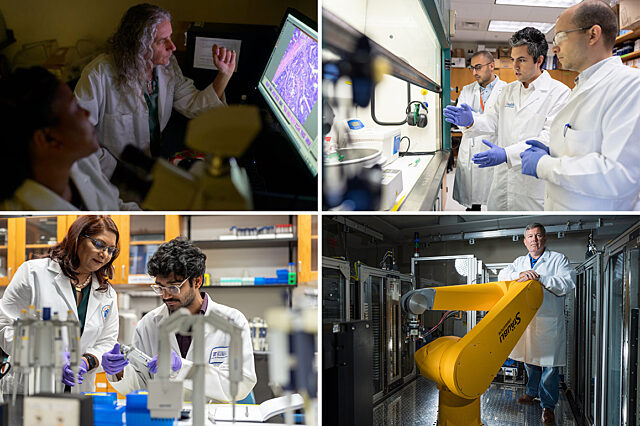UF Health Cancer Center expands research programs to enhance discoveries

Clockwise from top left, Christian Jobin, Ph.D., and Elias Sayour, M.D., Ph.D., (center) will lead a new research program focused on translational immune-oncology and the microbiome. Timothy Spicer, Ph.D., of The Herbert Wertheim UF Scripps Institute for Biomedical Innovation & Technology, and Jatinder Lamba, Ph.D., (left) will lead a new program focused on drug discovery and pharmacogenomics.
The University of Florida Health Cancer Center has expanded its research programs to strengthen the impact of cancer research and meet the needs of an expanding membership. The expansion will make it easier and faster for investigators to directly apply their discoveries to clinical care, for the ultimate benefit of patients and community members.
The expansion is part of the center’s continued development as a National Cancer Institute-designated cancer center. The new programs will deepen the center’s collaboration with colleagues at The Herbert Wertheim UF Scripps Institute for Biomedical Innovation & Technology, leveraging leading-edge technology such as robot-assisted drug discovery to complement pharmacogenomics research at UF. At the same time, it will bring together experts who are conducting research across the immunotherapy spectrum, from the brain to the gut microbiome.
“We are providing more opportunities for our members to collaborate across departments and across campuses, in keeping with our ‘all hands on deck’ approach to solving the problem of cancer,” said Thomas George, M.D., FACP, deputy director of the Cancer Center. “Our goal is to spur more translation of our research findings directly to clinical trials, for the ultimate benefit of our patients and communities.”
To help bring deeper focus to promising research arenas, two programs have been created from the original Cancer Therapeutics and Host Response research program, which is being retired. The Immuno-Oncology and Microbiome program, or IOM, will bring together experts in translational immunotherapy, such as mRNA vaccines, with innovative researchers who study the role of the microbiome in cancer and responses to immunotherapy treatment.
The second program, called Cancer Targeting and Therapeutics, or CTT, will partner researchers who explore how genetics affect responses to cancer drugs with researchers who are developing drugs to treat cancer, such as those that target RNA in new ways. This group will also include engineers, chemists and other scientists who have expertise in cancer biomarkers, treatment targeting and device development.
The new research programs will complement the Cancer Center’s two other well-established programs that focus on the basic molecular biology associated with cancer and community and population-based health.
Immuno-Oncology and Microbiome
This program combines skills in numerous aspects of immune-based cancer therapy, such as personalized cancer vaccines based on nanoparticles. It draws together nearly 40 members from 12 UF departments and five colleges and has clinical investigators who are involved in 39 clinical trials.
The program will be led by Christian Jobin, Ph.D., a professor in the division of gastroenterology, hepatology and nutrition in the UF College of Medicine, and Elias Sayour, M.D., Ph.D., an associate professor in the departments of neurosurgery and pediatrics in the UF College of Medicine.
Jobin’s research focuses on understanding how the trillions of microorganisms living inside the gut — known as the microbiota — play a role in cancer. Sayour’s research focuses on developing nanotechnology vaccines to reprogram the immune system against cancer cells. Clinical trials in collaboration with the UF College of Veterinary Medicine in pet dogs with malignant brain tumors have produced positive results for a novel mRNA vaccine approach, which will accelerate clinical trials in humans. Researchers are expanding these comparative medicine approaches to cancers such as lung and skin, which are prevalent in the geographic area the UF Health Cancer Center serves.
Cancer Targeting and Therapeutics
The CTT program brings together over 40 members from 19 departments and five UF colleges and has clinical investigators who are involved in 78 clinical trials. The program will be co-led by Jatinder Lamba, Ph.D., a professor in the department of pharmacotherapy and translational research and the associate dean for research and graduate education in the UF College of Pharmacy, and Timothy Spicer, Ph.D., senior scientific director and a professor of molecular medicine at The Wertheim UF Scripps Institute.
Lamba’s research uses genetics to develop more personalized and effective chemotherapy drug treatments for cancer, with a focus on leukemia. This work aligns with new opportunities available through The Wertheim UF Scripps High-Throughput Molecular Screening Center, co-directed by Spicer. The screening center uses a robotic process that rapidly tests hundreds of thousands of drug-like compounds against any target of unmet therapeutic need, including all forms of cancer.
The CTT program will also strengthen collaborations with the lab of Matthew Disney, Ph.D., a professor and chair of the department of chemistry at The Wertheim UF Scripps Institute, who has pioneered a framework for developing small-molecule drugs that target RNA. Researchers in the Cancer Center’s Mechanisms of Oncogenesis research program are collaborating with Disney to use this framework in lung cancer and Kaposi sarcoma-associated herpesvirus and Epstein-Barr virus-associated lymphomas.
“The world-class facilities at UF Scripps will complement the Cancer Center’s strengths, opening up new opportunities for collaborative grants,” said Rolf Renne, Ph.D., associate director for basic sciences at the UF Health Cancer Center. “We have an unprecedented opportunity to rapidly build on this foundation as we enter our next phase of growth and meaningful impact.”
About the author
